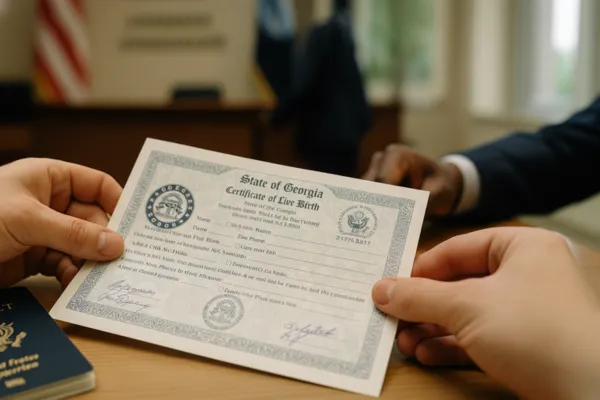
U.S. Documents for Immigration Abroad? Here’s When You Need an Apostille
For immigration attorneys and legal teams managing international filings, knowing when a U.S. document requires an apostille can mean the difference between a smooth process and a costly delay.
A Common Scenario
Your client’s spouse needs to submit a U.S. birth certificate to the Ministry of Foreign Affairs — but the clock is ticking. The attorney pauses mid-email and asks the question every immigration team eventually faces:
“Do we need an apostille for this?”
Situations like this are common for immigration attorneys — and they often come down to one overlooked requirement: the apostille.
What Is an Apostille?

An apostille is a legal certification that authenticates a U.S. document for use in another country.
It verifies the origin of the document’s signature, seal, or stamp so it can be accepted abroad without additional legalization steps.
Apostilles are recognized by countries that are members of the Hague Apostille Convention, a global treaty simplifying how documents are verified for international use.
It’s important to note that an apostille is not the same as notarization or translation — though those may be part of the same process.
When Immigration Clients Need One
Attorneys typically encounter apostille requirements when:
A U.S.-born client is applying for citizenship, residency, or marriage abroad.
A foreign-born spouse or relative needs to present U.S. records in a Hague-member country.
A client is submitting documents to a consulate, embassy, or foreign court.
Commonly apostilled documents include:
Birth or marriage certificates
FBI background checks
Power of attorney
Naturalization certificates (certified copies only)
Common Mistakes That Cause Delays
Even well-prepared legal teams can lose time due to small errors.
Here are some of the most frequent issues we see:
Sending originals instead of certified copies.
Skipping a required notarization step.
Mailing to the wrong office — not knowing whether it’s a state or federal submission.
Attempting a do-it-yourself process without a clear checklist or timeline.
Each of these mistakes can add days or even weeks to a filing — and in immigration matters, time is rarely a luxury.
Why Immigration Attorneys Trust GiNN

At GiNN Mobile Notary & Apostille, we specialize in helping attorneys and paralegals navigate this process seamlessly.
Our team provides:
Clear guidance on whether a document requires state or federal authentication
Coordination with translation partners, when needed
Complete document handling — from verification to submission and return
Fast, accurate turnaround through trusted Georgia and national channels
Attorneys count on GiNN because we combine speed with precision — ensuring every apostille is completed correctly the first time.
Our Commitment
When it comes to cross-border filings, accuracy is everything.
A single overlooked detail can delay your client’s case or risk a rejected submission.
Our team is here to help you handle the details accurately and on time.
If you or your firm is preparing immigration documents for international use, let’s make sure every requirement is met from the start.
Related Resource
Coming Soon: How Georgia Firms Avoid Apostille Delays
